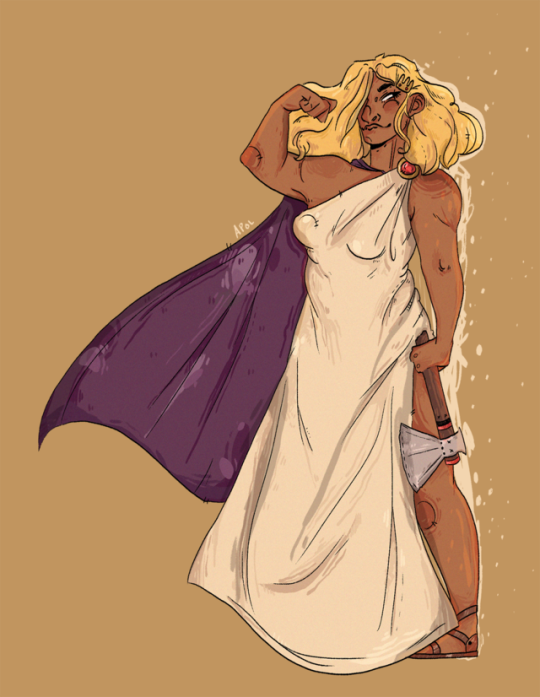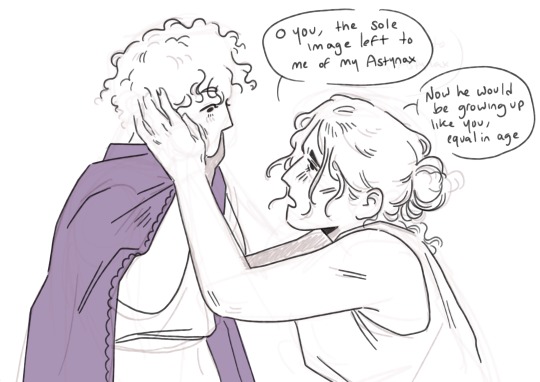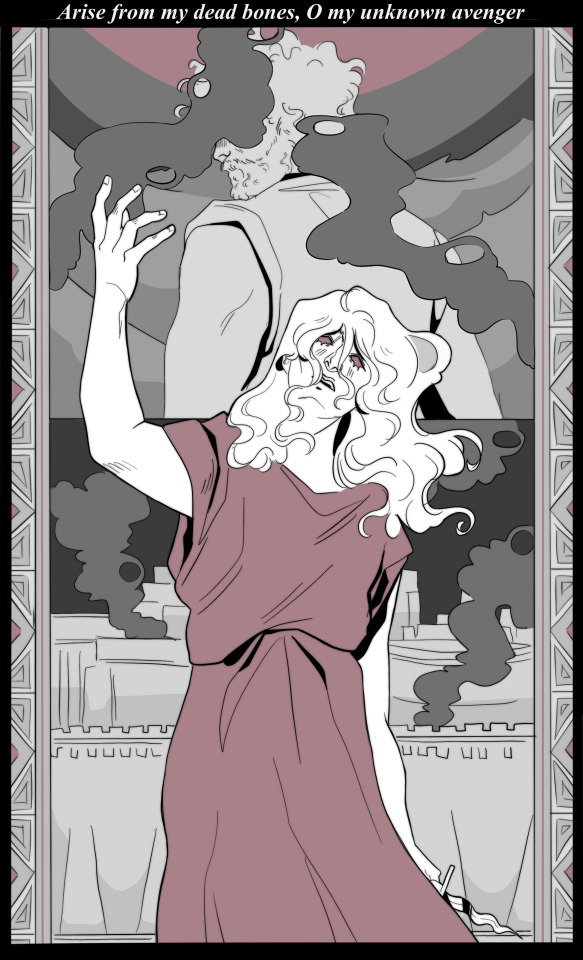aeneiddaily.substack.com profile picture by zhan zhang on unsplash
Don't wanna be here? Send us removal request.
Text
honestly what the pictures on my shield signify is none of my business
104 notes
·
View notes
Text

[image description: the following lines spoken by vulcan in a.s. kline's translation of Aeneid 8:
“Why do you seek instances from the past? Goddess, where has your faith in me gone? If your anxiety then was the same, it would have been right for me too to arm the Trojans then; neither fate nor the almighty Father refused to let Troy stand, or Priam live, ten years more.
/end description.]
the way the destruction of troy was always fated... the way that vulcan could have let it stand another ten years but that still wouldn't have changed the ultimate ending... the way fate in the aeneid is bendable but never breakable; you can delay the ending as long as you like, but you can't escape.
25 notes
·
View notes
Photo

Virgil’s Camilla, commissioned by @tibgracchus
[commission info]
247 notes
·
View notes
Text
if anybody got a book 11 post in your inbox just now
no you did not.
3 notes
·
View notes
Text

Referenced directly from Peter Paul Rubens’ painting “Aeneas in the Underworld”
I just think he’s Neat
Reference under cut

#have been forgetting to reblog these at the right times. so sorry i'm in the underworld personally#book 6
48 notes
·
View notes
Text
ARE WE ALL READY FOR BOOK SIX??? I'M NOT.
4 notes
·
View notes
Text
taking special care to post this one, mostly because i think constantly about @catilinas's contribution to the footnotes
1 note
·
View note
Text





"[Aeneas] tells Achates to fetch some gifts as well, plucked from the ruins of Troy: a gown stiff with figures stitched in gold, and a woven veil with yellow sprays of acanthus round the border. Helen’s glory, gifts she carried out of Mycenae, fleeing Argos for Troy to seal her wicked marriage— the marvelous handiwork of Helen’s mother, Leda."
-- Aeneid 1.647-52, trans. Fagles
"Acanthus often has a special binary significance, serving to mediate between life and death, and most likely contributed to the plant's popularity in funerary contexts ... Perhaps the most important animal motif on the Ara Pacis is the snake that is about to consume fledglings huddled together in a nest directly below the great acanthus calyx. Symbolically, the snake and the nestlings recall the omen prefiguring the fall of Troy, out of whose ashes arose Rome."
-- From Republic to Empire: Rhetoric, Religion, and Power in the Visual Culture of Ancient Rome, John Pollini
Dido ... clambers in frenzy up the soaring pyre and unsheathes a sword, a Trojan sword she once sought as a gift, but not for such an end. ...
her women see her doubled over the sword, the blood foaming over the blade, her hands splattered red.
...
sobs, and grief, and the wails of women ringing out through homes, and the heavens echo back the keening din— for all the world as if enemies stormed the walls and all of Carthage or old Tyre were toppling down and flames in their fury, wave on mounting wave were billowing over the roofs of men and gods.
-- Aeneid 4.646-7, 63-4, 67-71; trans. Fagles
605 notes
·
View notes
Text




aeneid 1.384 (about aeneas) / 4.465 (about dido) trans. a.s. kline
34 notes
·
View notes
Text

every sentence out of Aeneas' mouth this entry is digging the hole deeper
417 notes
·
View notes
Text


aeneid 4.260-4 trans. a.s. kline
i just think it’s shrimpteresting how what kline translates as ‘cloak’ is very specifically a laena, i.e. the heavy double-toga-like garment that had to be worn by the flamen dialis. the flamen dialis who was the special priest of jupiter (when it is jupiter who causes mercury to go and visit aeneas in this scene, to get his fate back on track) (when the position of flamen dialis has some very specific conditions about who the priest can marry. conditions that dido extremely does not meet). servius has a Lot to say about the laena + vergil presenting aeneas as a priest etc but nothing about how the laena is slipping off his shoulders? like that symbolism seems pretty obvious. or the fact that the restrictions on the flamen dialis are sooo incompatible with everything else about aeneas. like the flamen dialis isn’t allowed to touch corpses or visit tombs and aeneas literally goes to the underworld. ALSO shrimpteresting that the laena is part of Such a roman priesthood but like. dido made it for him???
104 notes
·
View notes
Text
CAN WE GET A BIG OLD ROUND OF APPLAUSE FOR CAVE SEX!
2 notes
·
View notes
Text
man there's something about the way vergil describes polyphemus when aeneas and his crew rescue achaemenides that's making me just. insanely emotional
353 notes
·
View notes
Text
A part of the Aeneid that’s underrated: in Book 2, Sinon, one of the Greeks, stays behind with the Trojan Horse; he tells the Trojans some long, very fake story about how the Greeks tried to kill him, and ultimately abandoned him on the shores of Troy. The Trojans take him in; we give him life, and pity him even more. And they tell him, you’ll be one of us. And he was lying. They believed him, they accepted him, they pitied him, and he’s a huge part of why Troy falls and most of them die. Their compassion did not help them. Sometimes you hurt yourself very deeply by helping other people.
So the Trojan survivors would have every reason to be skeptical of strangers, especially Greek strangers. They’d suffered tremendously. The trauma of the fall of Troy itself, genocide, the loss of so many people, the exhaustion and pain tht comes with years of wandering without a home. And yet, when they reach the island of the Cyclops, they meet a Greek man, Achaemenides. He claims Ulysses had abandoned him on the island, and asks the Trojans to have mercy on him. They’re in a dangerous place, meeting someone who once attacked their home, killed friends or family members. It could be a trap. They don’t have any reason to trust him. And yet, they choose to take him in as one of their own. And they bring him off the island, into safety. Because they would rather put themselves in danger again and again than lose their love and humanity.
589 notes
·
View notes
Text

all this pyrrhus talk got my thinking about that scene in the Aeneid where Andromache meets ascanius
336 notes
·
View notes

